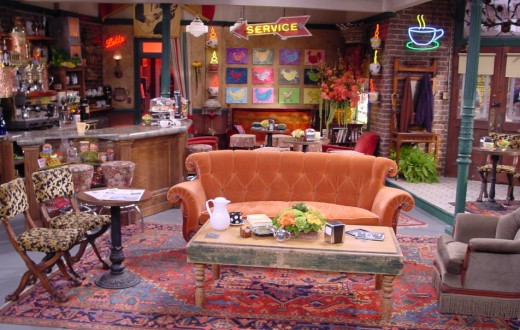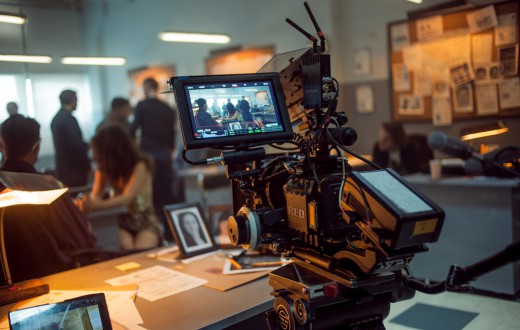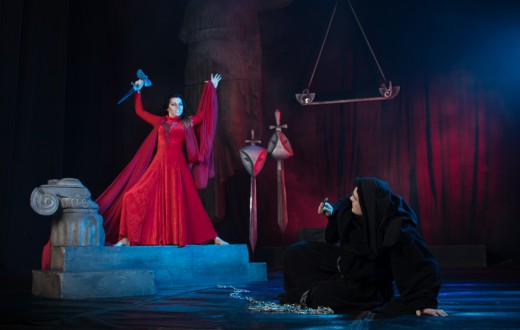The term body language is one that gets thrown around a lot in the context of acting. And while we all probably have a pretty good general idea of what the phrase means, perhaps it’s a good idea to take a closer look at it and think more carefully about how we can use our bodies to convey what we’re trying to communicate as performers.
First of all it’s important to understand that the way we move and carry ourselves and our facial expressions all taken together really is a language unto itself. One widely quoted study suggests that 93 percent of human communication actually takes place non-verbally.
Gives you a whole different perspective on misinterpreted text messages, no? And if you’re one of those people who hates talking on the phone, this might have something to do with it. When we’re on the phone, the fact that we’re speaking to one another gives us the illusion that we are communicating with as much accuracy as is ever possible between two people. But the fact of the matter is, the lack of facial cues and visible body language massively undercuts our ability to understand each other.
But back to acting. There are a few ways we can use body language to amplify the message we are trying to convey–and there’s some non-verbal language to avoid too.
1. Before you read
We’ve all probably heard the old saw about how if you act confidently, it can transfer actual confidence to you. And if you haven’t heard this, give it a try sometime and you will likely be amazed. Decide you’re just going to be that guy or girl who walks into the room with chest open and shoulders back, the one who smiles and says hi to everyone, making eye contact and moving deliberately with authority. It really works! You may be nervous at first and have to act through it, but you will likely find that the feedback you get, both verbal and non-verbal boosts your actual confidence.
But beyond that, think about this: why weren’t you confident last time you felt overly nervous at an audition? Because there’s actually no logical reason for it. If you’ve done the work, prepared a solid character with clear objectives and you’ve learned the lines as best you can in the time allotted, your focus shouldn’t be on whether you the actor is going to fall on your face; it shouldn’t be on you at all. You should be fully and completely focused on the character and his or her desires, and the tactics he or she is going to pursue to achieve them.
Let’s also dispense with the more obvious suggestions for what to do before you read. Do more than walk into the room as if you were that confident guy or girl, smiling, shaking hands firmly, and making eye contact: BE that person. Lack of confidence comes from uncertainty, from not knowing what is expected or what the right thing to do is.
That’s not you. You know what you’re doing. If you’ve done your homework there is no reason to think you are not that confident person.
When we walk into an audition we are asking the casting director to place a tremendous amount of trust in us. A scuttling, fearful actor who can’t make eye contact and looks like he might poop himself at any given moment does not inspire confidence. Walk deliberately with head held high and shoulders back, plant yourself and engage with the people behind the table with a smile, solid eye contact, and a firm handshake if they offer.
You’ve probably heard it said that acting confident is the first acting job of the day when you audition. True, but I’d take this one step further: it’s not up to the casting team to help you relax, it’s your job to make THEM feel relaxed. Conveying confidence in your ability and preparation with your body language is the first step toward achieving this.
2. “Okay, whenever you’re ready.”
So, hellos have been said, you’ve shown yourself to be a confident actor who is comfortable in his or her own skin. Now it’s time to get down to the actual work. The temptation is to launch into your audition piece immediately, perhaps trying to grasp onto your lines before they escape from your brain like the traitors they are. But this is a rookie mistake. Here too it’s important to be deliberate and take your time.
Imagine you’re slipping on a jacket that represents your character. Done right, this can be a tremendously impactful piece of acting before you say a single word: is the character a victim? Powerful? Frightened? Arrogant? Broken-hearted? What does that do to his or her posture? Make a solid, clear physical shift from your own confident, relaxed stance to that of the character before you speak.
This is your time. Don’t drag it out, but on the other hand take a deep breath and fully engage with the pre-beat and envision your character before launching into your piece. Close your eyes and picture the world where the scene is taking place and let that wash through your body and inform your movements and posture. And begin only when you’re truly ready.
3. After
This is pretty much the reverse of the entrance. You want to shift back to yourself and out of the character, and say a confident “thank you.” And there’s a trick to hanging around just long enough to give the casting team a chance to ask you anything they might have on their minds or suggest an adjustment–without seeming like you are begging for it.
If nothing like that is forthcoming, head toward the door with your same confident, slow, deliberate walk, shoulders back and head held high. Even though the relief of being done with a read often leads us to want nothing more than to rush the door in a near-sprint, this is a mistake. You are on stage every moment you are at the audition, and even more so when you are in the room with the casting team.
Just remember above all that you are a professional offering your services to other professionals, should the pairing work for all parties. Don’t give away your power by rushing around or cowering, and be that professional by taking the time to fully put on the cloak of your character before you read and take it off afterward. And break a leg!







